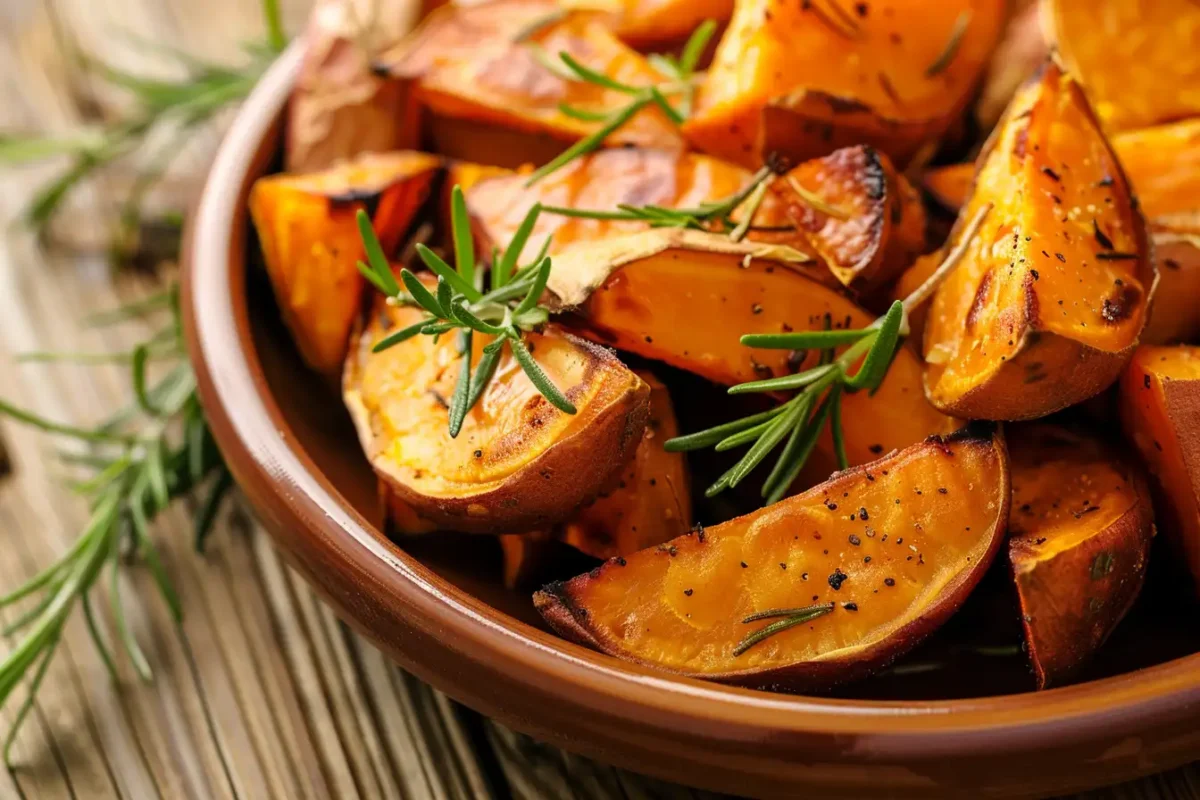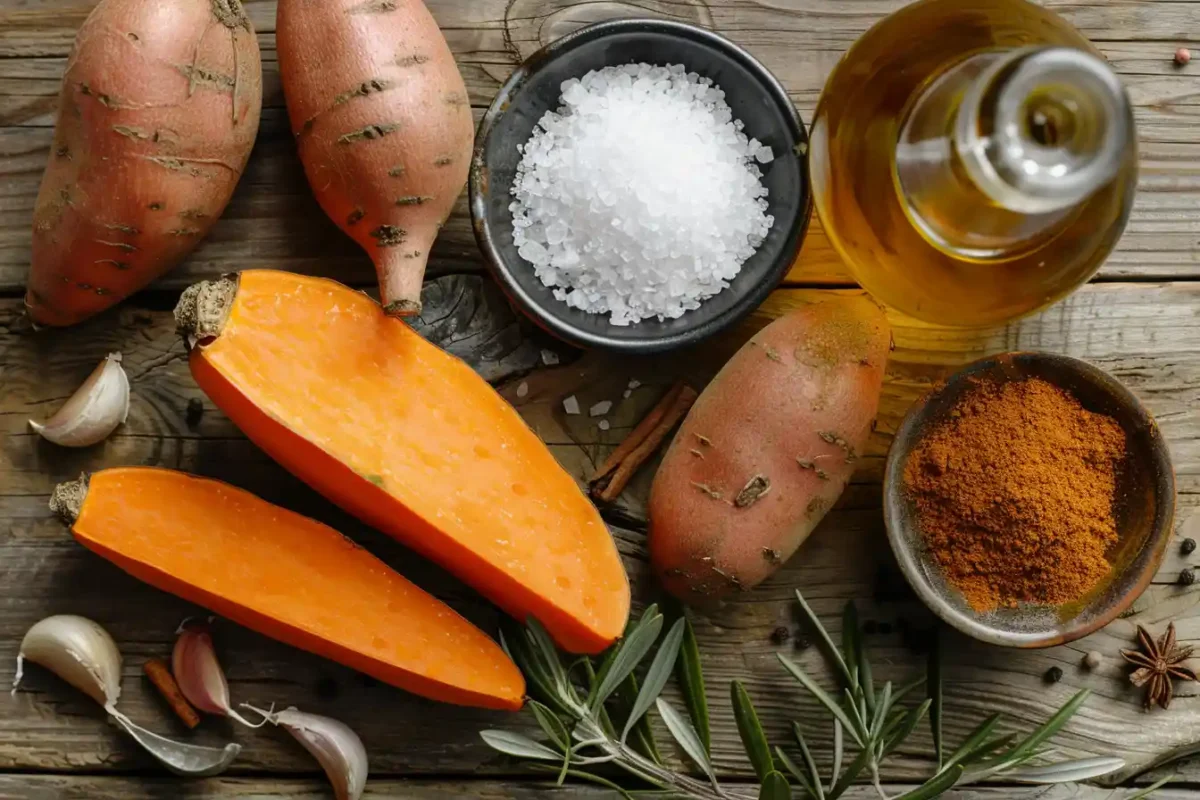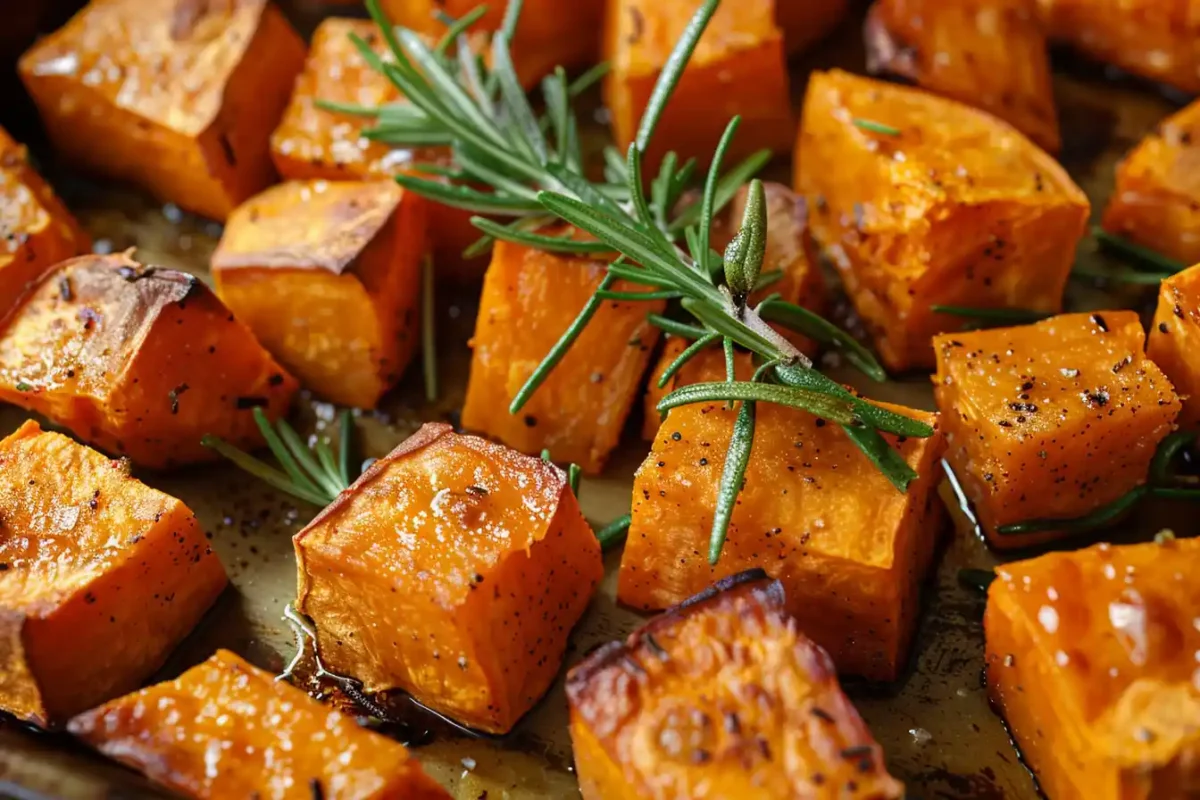Are you ready to discover how Sweet Potato Benefits can revolutionize your meals and boost your health? In this comprehensive guide, you’ll learn everything you need to know about the nutritional power of sweet potatoes, how to prepare them, and creative ways to enjoy their natural goodness. By the end of this article, you’ll not only understand why sweet potatoes are a must-have in your kitchen but also how to transform them into delectable dishes that your family and friends will adore. So, let’s dive right in and explore the amazing world of Sweet Potato Benefits!
“Sweet potatoes are nature’s gift—a versatile, nutrient-packed vegetable that makes healthy eating a delicious adventure.”
Jump to :
Why You’ll Love Sweet Potato Benefits
You’ll love the Sweet Potato Benefits for countless reasons. First and foremost, sweet potatoes are loaded with essential vitamins and minerals that can boost your immune system, improve digestion, and support overall health. They are rich in beta-carotene, fiber, and antioxidants, making them a superb addition to any balanced diet. Moreover, their natural sweetness pairs well with both savory and sweet recipes, offering endless culinary possibilities.
Not only do sweet potatoes satisfy your taste buds, but they also offer impressive versatility. Whether baked, mashed, roasted, or blended into a smoothie, you can enjoy these root vegetables in various forms. In addition, their vibrant color adds an appealing aesthetic to your meals, which is a bonus if you love to entertain or simply enjoy beautiful food presentations.
Furthermore, sweet potatoes are an excellent source of complex carbohydrates, providing long-lasting energy. This makes them an ideal snack or meal component, especially if you lead an active lifestyle. As you continue reading, you’ll uncover more reasons why the nutritional and culinary delights of Sweet Potato Benefits should be a staple in your kitchen.

Nutritional Information and Benefits of Sweet Potato Benefits
Sweet potatoes are not just delicious—they’re a nutritional powerhouse. Here’s a detailed look at their nutrient profile:
| Nutrient | Amount per 100g | % Daily Value |
|---|---|---|
| Calories | 86 kcal | 4% |
| Carbohydrates | 20.1 g | 7% |
| Dietary Fiber | 3 g | 12% |
| Protein | 1.6 g | 3% |
| Vitamin A (beta-carotene) | 14,187 IU | 284% |
| Vitamin C | 2.4 mg | 4% |
| Potassium | 337 mg | 10% |
| Manganese | 0.3 mg | 16% |
These values underline why sweet potatoes are cherished for their health benefits. The high vitamin A content, primarily derived from beta-carotene, supports vision and immune function. Additionally, the dietary fiber aids in digestion, while the potassium helps maintain healthy blood pressure. Consequently, incorporating sweet potatoes into your diet can contribute to overall wellness, energy, and longevity.
Moreover, the antioxidants present in sweet potatoes play a crucial role in reducing oxidative stress, which is linked to chronic diseases. In short, when you enjoy Sweet Potato Benefits, you’re not only savoring a tasty treat but also nurturing your body from the inside out.
“In every bite of a sweet potato, you taste the promise of nourishment and vitality—a true superfood in disguise.”
Ingredients and Their Roles
Creating a dish that showcases the best of Sweet Potato Benefits requires a thoughtful selection of ingredients. Below is a table detailing the key components, their roles, and recommended quantities:
| Ingredient | Role in the Recipe | Quantity |
|---|---|---|
| Sweet potatoes | Main ingredient; provides flavor and nutrients | 2 large (approx. 500g) |
| Olive oil | Enhances flavor and aids in roasting | 2 tablespoons |
| Sea salt | Balances flavors; enhances natural sweetness | 1 teaspoon |
| Black pepper | Adds a subtle kick of spice | ½ teaspoon |
| Cinnamon (optional) | Adds warmth and depth, especially in sweet dishes | ¼ teaspoon |
| Garlic powder | Infuses an extra layer of savory taste | ½ teaspoon |
| Fresh herbs (e.g., rosemary or thyme) | Complements the natural flavor and provides a fresh finish | A few sprigs or 1 teaspoon dried |
Each ingredient is carefully chosen to complement the Sweet Potato Benefits while ensuring a harmonious blend of taste and nutrition. The olive oil not only helps in roasting but also enhances the absorption of fat-soluble vitamins. The optional spices like cinnamon and garlic powder offer variations to cater to different taste preferences. As you progress through this guide, you’ll see how each of these ingredients contributes to making a dish that’s as visually appealing as it is nutritious.

Step-by-Step Guide to Making Sweet Potato Benefits
Creating a dish that highlights Sweet Potato Benefits is both fun and straightforward. Follow this step-by-step guide to craft a delightful meal that’s perfect for any occasion.
Step 1: Preparation and Ingredient Gathering
Begin by selecting fresh, firm sweet potatoes. Wash them thoroughly to remove any dirt, and then peel them if you prefer a smoother texture. However, leaving the skin on can add extra fiber and nutrients. Cut the sweet potatoes into evenly sized cubes or slices to ensure uniform cooking.
Simultaneously, gather all your ingredients listed in the table above. Preheat your oven to 400°F (200°C) as you prepare your workspace. Having all your components ready is key to a seamless cooking process.
Step 2: Cooking and Blending
Drizzle the sweet potato pieces with olive oil, then sprinkle sea salt, black pepper, garlic powder, and, if desired, a pinch of cinnamon. Toss them gently to ensure each piece is well-coated. Arrange the seasoned sweet potatoes in a single layer on a baking sheet. This step is crucial, as even spacing allows the heat to circulate properly, ensuring a crispy exterior and tender interior.
Place the baking sheet in the preheated oven and roast for 25-30 minutes. Halfway through, stir the sweet potatoes to promote even browning. The aroma filling your kitchen is a delightful sign that your dish is on track!
Step 3: Finishing Touches and Serving
Once the sweet potatoes are tender and lightly caramelized, remove them from the oven. For an added burst of flavor, sprinkle freshly chopped herbs like rosemary or thyme over the top. Let the dish cool slightly before serving. Whether you decide to serve them as a hearty side dish or a nutritious main course, your creation is now ready to enjoy.
Throughout this process, the Sweet Potato Benefits are evident—not only in the delightful taste but also in the nutrient-rich profile that supports your healthy lifestyle.
Tips and Tricks for the Best Sweet Potato Benefits
To truly unlock the potential of Sweet Potato Benefits, consider these expert tips:
- Roasting to Perfection: For extra crispiness, try roasting sweet potato slices on a baking rack to allow air circulation beneath each piece.
- Spice It Up: Experiment with different spice blends such as smoked paprika, cumin, or a pinch of nutmeg to create varied flavor profiles.
- Texture Variety: If you prefer a creamy texture, consider boiling the sweet potatoes before mashing them with a drizzle of olive oil.
- Storage Solutions: Leftovers can be stored in an airtight container in the refrigerator for up to 3 days. Reheat in the oven to maintain texture.
By following these practical suggestions, you can enhance the flavor and nutritional impact of your dish. Moreover, these tweaks ensure that every bite of your recipe is as enjoyable as it is healthful. Looking to optimize your meal planning? Our guide, Can I Freeze High-Protein Bagels for Later? The Ultimate Guide, offers fantastic tips to help you keep your meals fresh and nutritious.
Variations and Substitutions
One of the greatest aspects of working with sweet potatoes is their versatility. Here are some variations and substitutions to keep your menu exciting:
- For a Spicier Kick: Replace black pepper with chili flakes or a dash of cayenne pepper.
- For a Creamier Dish: Substitute a portion of the olive oil with coconut oil, which adds a subtle tropical flavor while still being heart-healthy.
- For a Crunchy Twist: Top the roasted sweet potatoes with toasted nuts like almonds or walnuts for an extra crunch.
- For a Savory Spin: Mix in finely chopped onions or bell peppers before roasting to elevate the dish’s complexity.
“If you’re in the mood for a sweet treat, why not try our Sweet Potato Brownies This recipe offers a delightful balance of health and indulgence.”
These alternatives allow you to adapt the dish to your taste preferences and dietary needs. Experimenting with these variations ensures that you’ll never tire of the delightful Sweet Potato Benefits.

For even more creative dessert ideas, check out our Sweet Potato Brownie Variations: A Delicious Twist on a Classic Treat, which puts a new spin on a beloved classic.
Serving Suggestions and Presentation Tips
Presentation is key when showcasing the Sweet Potato Benefits. Here are some creative serving suggestions:
- Elegant Plating: Serve your roasted sweet potatoes on a stylish plate with a sprinkle of fresh herbs and a light drizzle of balsamic reduction for an upscale presentation.
- Family-Style Feast: Arrange the sweet potatoes in a large serving bowl, garnished with colorful vegetables, to create a vibrant and inviting centerpiece for your dining table.
- Side Dish or Main Course: Depending on your preference, you can serve the dish as a hearty side or a main course. Pair it with a fresh green salad or a light protein like grilled chicken or tofu for a balanced meal.
- Dip Delight: Complement your dish with a side of hummus or a creamy avocado dip, which enhances the natural sweetness of the potatoes.
Remember, a little creativity in presentation goes a long way in making your dish appealing not only in taste but also in visual appeal.
Frequently Asked Questions
Q1: What makes sweet potatoes so healthy?
A1: Sweet potatoes are rich in vitamins, minerals, antioxidants, and fiber. These nutrients help boost immunity, support digestion, and promote overall health.
Q2: Can I eat sweet potatoes raw?
A2: While you can eat raw sweet potatoes, cooking them enhances their flavor, texture, and nutrient availability, making them easier to digest.
Q3: Are sweet potatoes good for weight loss?
A3: Yes, thanks to their high fiber content and low calorie density, sweet potatoes can help keep you full longer, aiding in weight management.
Q4: How do I store leftover roasted sweet potatoes?
A4: Store leftovers in an airtight container in the refrigerator for up to 3 days. Reheat them in the oven to retain their crispness and flavor.
Conclusion
In summary, the Sweet Potato Benefits are abundant and far-reaching—from their exceptional nutritional profile to their versatility in the kitchen. By incorporating these nutrient-rich root vegetables into your diet, you’re not only enhancing your meals but also taking a significant step towards a healthier lifestyle. Every aspect of this guide—from the nutritional facts and ingredient roles to the detailed step-by-step preparation—has been designed to help you harness the true potential of sweet potatoes.
Final Thoughts
Reflecting on the myriad ways you can enjoy Sweet Potato Benefits, it’s clear that these humble root vegetables deserve a prime spot on your plate. Their rich flavor, impressive nutritional content, and endless versatility make them a favorite among health enthusiasts and food lovers alike. Embracing sweet potatoes in your daily meals can transform your cooking routine, making healthy eating both enjoyable and exciting.
“The beauty of cooking lies in experimenting with nature’s bounty. Sweet potatoes offer endless possibilities, inviting you to create, innovate, and savor every bite.”
Call to Action
We’d love to hear about your experiences with Sweet Potato Benefits! Have you tried any unique recipes or creative twists with sweet potatoes? Share your tips, photos, and success stories in the comments below. Your feedback inspires us and helps build a community of health-conscious food enthusiasts.
Would you try this? Tell us below!

